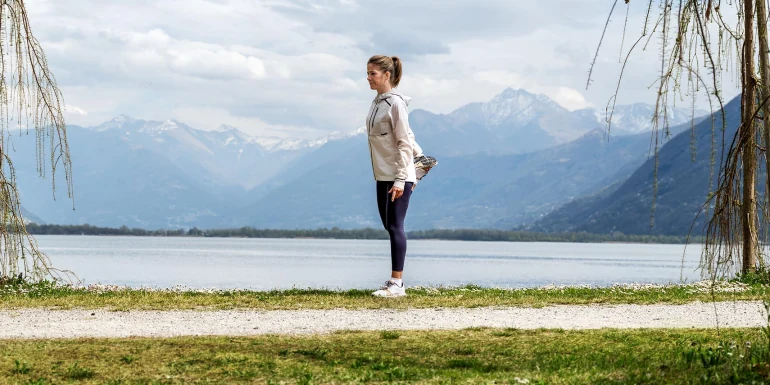
Aching muscles: the key facts
After exercising, your muscles ache and climbing stairs is painful – aching muscles are one of the most widespread sports injuries. What helps combat them?
We have all been there: vigorous exercise, or exercise you are not used to, can often leave you with aching muscles. Actions that stop you moving, for example when you are going downhill or doing exercise that involves a lot of stopping and sprinting, are a particular culprit.
These aching muscles can be extremely painful: your muscles are stiff, hard and sensitive to pressure. But there is no need to worry! The tiny injuries in the muscle tissue heal themselves with time. The muscle begins to regenerate after 48 hours at the latest. And the pain should have vanished after no more than a week. There is no residual damage.
What’s more, aching muscles are not bad per se. It shows that your muscles are adapting after intensive training, making them more resilient. Good training, however, does not necessarily lead to aching muscles. Even if you do not feel any pain the following morning, your body still builds muscles provided the stimuli from the training were sufficiently great.
What causes sore muscles?
New exercises, unusual strain or starting up again after an extended break can also lead to aching muscles for people used to exercising. Where does the pain come from? Tiny tears occur in our muscles. The tissue becomes inflamed, water enters the muscles and they swell. Pain develops as soon as the accumulated fluid presses against the surrounding tissue and nerves. This might take up to three days. This explains why sore muscles never start while we are still exercising.
While it was once believed that the aching muscles were caused by excess lactic acid, this theory has since been debunked.
How to prevent aching muscles
Always warm up
Warm up your muscles before exercising by doing some gentle stretches or jogging. The heightened blood circulation increases elasticity, meaning our muscle fibres tear less quickly. But while stretching after exercise keeps us mobile and supple, it doesn't help to prevent aching muscles because stretching can’t repair the muscle fibres that have been injured.
Adjust the intensity
When we exercise, our body does not send us a signal that the strain is too much. So, always adapt the intensity of your training to your fitness level. Do not put muscles that aren’t used to being worked under too much strain for too long.
Increase things at a slow pace
Increase the intensity of your workouts slowly and gradually. For example, start strength training with light weights and increase these through to the end of your session.
Get regular exercise
Well-trained muscles don’t feel the strain as quickly. Regular endurance training – at least twice a week – encourages better coordination between the individual muscles, meaning that the strain is better distributed.
Tips to alleviate sore muscles
Exercise
Gentle aerobic exercise or light jogging can ease the symptoms. If you are in a lot of pain, take a break and rest until the pain subsides.
Heat
Heat helps to relax tense muscles. A visit to the sauna or a warm bath with rosemary or pine needle oil stimulate blood circulation. A warming ointment also helps.
Diet
Carbohydrates and protein deliver the nutrients that your muscles need and our body uses to repair muscle tears. Omega 3 fatty acids promote muscle regeneration and development. After exercising, you should also replenish your magnesium stocks. While this particular mineral is great for regenerating your muscles, it won’t prevent muscle tears, although it can help with cramps and tension.
Massage
Whether massages actually support regeneration is a matter of dispute. While they stimulate blood circulation and loosen the connective tissues, they can sometimes be an additional source of irritation for the painful muscles. But there is nothing to say you shouldn’t gently massage the affected areas yourself as long as it feels comfortable.
If you suffer from sore muscles on a regular basis, you might be overdoing the exercise and not resting enough. This exacerbates these micro-injuries. See aching muscles as a warning signal that your body is sending you. Would you like tips on how to adapt your workout routine? We would be happy to answer any questions you may have about your health.
Harmless muscle pain – or a serious muscle injury?
When your muscles ache, they feel hard and extremely sensitive to touch. The pain restricts your mobility. You also have less strength. If you are not sure whether you might actually have a serious muscle injury, the following questions help:
- Have you recently done an excessive amount of exercise?
- When did the pain emerge? During exercise or straight after a specific movement? The latter could indicate a pulled muscle. But note that in some cases, the pain also only develops up to 24 hours later, with strains.
- How long has the pain already lasted? Aching muscles generally disappear within a week at the most. If the pain lasts longer, there is likely to be another reason. Ask your doctor for advice.
You yourself are the only obstacle to enjoying exercise because sore muscles often come about when we overdo it and overestimate how much we can take. So, take things down a notch next time and get even more from the positive mood-boosting effects of exercise.

The sports scientist (MSc in Rehabilitation and Prevention in Sport) provided the editorial team with advice and input for this article.


Newsletter
Find out more about current health issues every month and get all the information you need about our attractive offers from all Helsana Group companies * delivered by e-mail to read whenever it suits you. Our newsletter is free of charge and you can sign up here:
We did not receive your information. Please try again later.
* The Helsana Group comprises Helsana Insurance Company Ltd, Helsana Supplementary Insurances Ltd and Helsana Accidents Ltd.